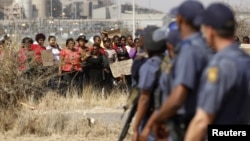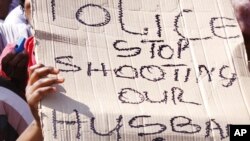JOHANNESBURG — South African President Jacob Zuma has ordered an official inquiry into the police killing of 34 striking miners, the deadliest security operation in the country since the end of apartheid.
Zuma said he was "shocked and dismayed" at what he called "senseless violence."
The president cut short a visit Friday to a regional summit in Mozambique and traveled to the mine in Marikana, northwest of Johannesburg. Zuma stopped short of saying who was responsible for the killings and urged unions to work with the government to address the situation.
South African police say 34 people were killed in a shootout between police and angry miners at a troubled platinum mine. But police, unions and the presidency have stopped short of saying who is at fault.
South Africa’s police commissioner on Friday visited the scene of a deadly shootout between police and strikers at the Lonmin platinum mine in the nation’s northwest.
A confrontration Thursday between striking miners and police turned into a gunbattle.
Police spokesman Capt. Dennis Adraio said Friday that in addition to the deaths, 78 people were wounded. Police have arrested 259 people.
Source: Chamber of Mines of South Africa Figures for 2010
Adraio said police did everything they could to avert a shootout - and have video to prove it.
“The South African service national police commissioner General Riah Phiyega showed footage, which highlighted that police have exhausted all possible methods of crowd management using minimum force before having to resort to self-defense," said Adraio. "Methods of minimum force included the use of water cannons, tear gas, stun grenades and rubber bullets. The footage clearly shows how armed groups stormed through the police first line of defense, leaving the police with no other option but to use live ammunition as a last resort to protect themselves and conserve stability.”
South African President Jacob Zuma said in a statement that he was “shocked and dismayed at this senseless violence.”
But he stopped short of saying who was responsible, and called on unions to work with the government to address the situation and calm tensions.
Angry miners have protested at the mine for a week, after 3,000 workers walked out over a pay dispute. Some strikers have held signs demanding that monthly wages be tripled to about $1,500.
National Union of Mineworkers spokesman Lesiba Seshoka said Friday that part of the tension was sparked by workers’ decision to strike without union support.
“It can’t be right to have bargaining outside bargaining process because the bargaining processes had been concluded," said Seshoka. "So it would have have made more sense if they did not demand, but rather waited for the bargaining season to begin and then said to their leadership this is what we want now."
Source: UN
But Jeff Mphahlele, leader of the rival of the Association of Mineworkers and Construction Union, said the workers’ demands were fair and that police should not have fired.
Adraio, the police spokesman, said authorities are investigating.
“I think it’s too early stages to start blaming specific groupings," he said. "I think the investigations are presently underway and we need to wait for the final investigations to be complete, for the process to take place."
Strikes are common in South Africa, which has a strong confederation of unions and a large pool of menial workers.
The Lonmin mine is about 100 kilometers northwest of Johannesburg and is the source of the majority of the world’s platinum. Platinum prices spiked Thursday to close at a price of $1,435 for an ounce. Lonmin shares, however, dropped in London and Johannesburg.
The company says the dispute has cost six days’ worth of production, and the mine will not make its annual output goal.
About 3,000 people have walked off the job at the mine in the past week due to a pay dispute. Lonmin is the world's third-largest platinum producer.
<p><span class="article11"><i><span style="font-size: 7pt; line-height: 115%; font-family: "Times New Roman","";">Some information for this report was provided by AFP and Reuters.</span></i></span></p>
Zuma said he was "shocked and dismayed" at what he called "senseless violence."
The president cut short a visit Friday to a regional summit in Mozambique and traveled to the mine in Marikana, northwest of Johannesburg. Zuma stopped short of saying who was responsible for the killings and urged unions to work with the government to address the situation.
South African police say 34 people were killed in a shootout between police and angry miners at a troubled platinum mine. But police, unions and the presidency have stopped short of saying who is at fault.
South Africa’s police commissioner on Friday visited the scene of a deadly shootout between police and strikers at the Lonmin platinum mine in the nation’s northwest.
A confrontration Thursday between striking miners and police turned into a gunbattle.
Police spokesman Capt. Dennis Adraio said Friday that in addition to the deaths, 78 people were wounded. Police have arrested 259 people.
South Africa's Mining Industry
South Africa's Mining Industry- Number of workers: 498,141
- Industry deaths: 128
- Key commodities mined: Diamonds, gold, platinum, palladium
- Real mining GDP: $12.06 billion
- Mineral exports: $36.25 billion
Source: Chamber of Mines of South Africa Figures for 2010
“The South African service national police commissioner General Riah Phiyega showed footage, which highlighted that police have exhausted all possible methods of crowd management using minimum force before having to resort to self-defense," said Adraio. "Methods of minimum force included the use of water cannons, tear gas, stun grenades and rubber bullets. The footage clearly shows how armed groups stormed through the police first line of defense, leaving the police with no other option but to use live ammunition as a last resort to protect themselves and conserve stability.”
South African President Jacob Zuma said in a statement that he was “shocked and dismayed at this senseless violence.”
But he stopped short of saying who was responsible, and called on unions to work with the government to address the situation and calm tensions.
Angry miners have protested at the mine for a week, after 3,000 workers walked out over a pay dispute. Some strikers have held signs demanding that monthly wages be tripled to about $1,500.
National Union of Mineworkers spokesman Lesiba Seshoka said Friday that part of the tension was sparked by workers’ decision to strike without union support.
“It can’t be right to have bargaining outside bargaining process because the bargaining processes had been concluded," said Seshoka. "So it would have have made more sense if they did not demand, but rather waited for the bargaining season to begin and then said to their leadership this is what we want now."
African Percent of World Production
African Percent of World Production- Platinum Metals 54
- Phosphate 27
- Gold 20
- Chromium 40
- Diamonds 78
Source: UN
Adraio, the police spokesman, said authorities are investigating.
“I think it’s too early stages to start blaming specific groupings," he said. "I think the investigations are presently underway and we need to wait for the final investigations to be complete, for the process to take place."
Strikes are common in South Africa, which has a strong confederation of unions and a large pool of menial workers.
The Lonmin mine is about 100 kilometers northwest of Johannesburg and is the source of the majority of the world’s platinum. Platinum prices spiked Thursday to close at a price of $1,435 for an ounce. Lonmin shares, however, dropped in London and Johannesburg.
The company says the dispute has cost six days’ worth of production, and the mine will not make its annual output goal.
About 3,000 people have walked off the job at the mine in the past week due to a pay dispute. Lonmin is the world's third-largest platinum producer.
<p><span class="article11"><i><span style="font-size: 7pt; line-height: 115%; font-family: "Times New Roman","";">Some information for this report was provided by AFP and Reuters.</span></i></span></p>





